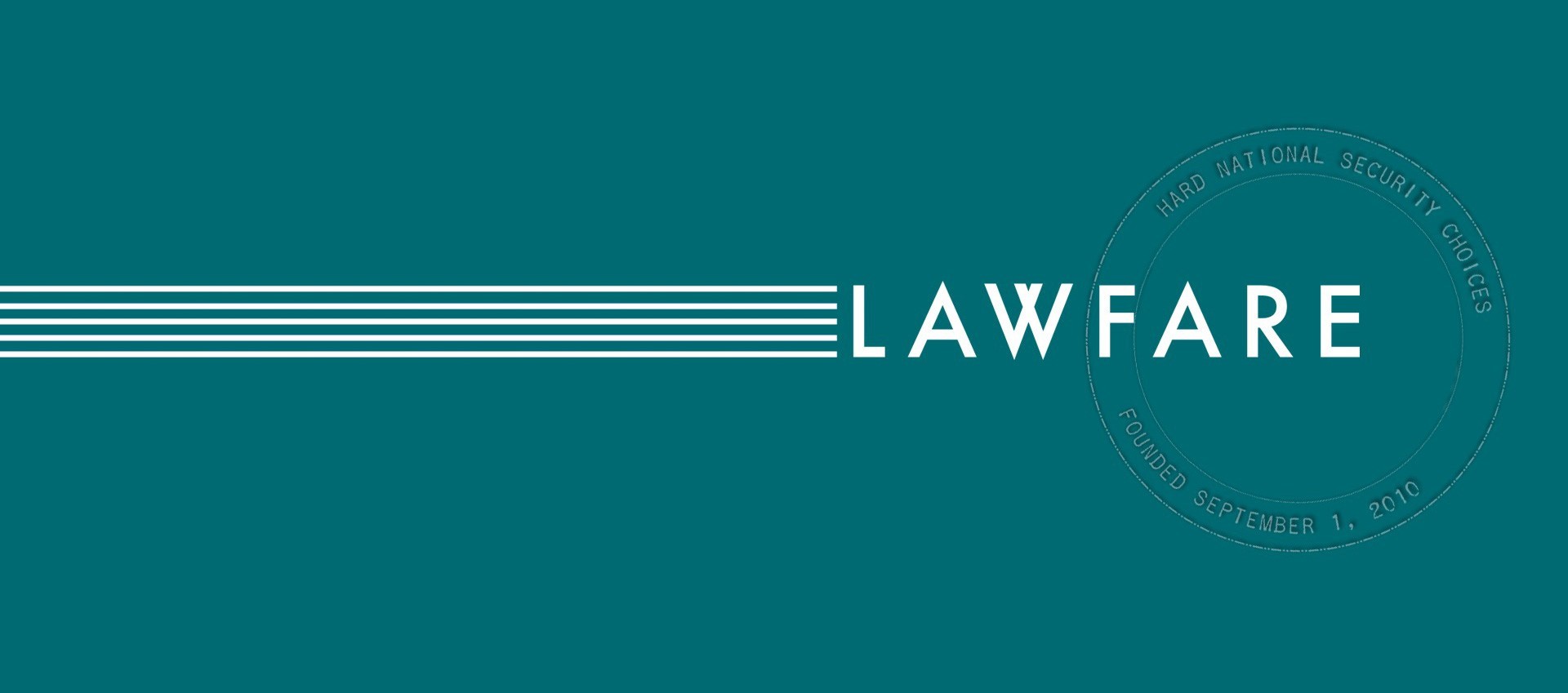The Week That Was: All of Lawfare in One Post

Published by The Lawfare Institute
in Cooperation With

Benjamin Wittes looked at Trump’s statement announcing that he received a target letter from Special Counsel Jack Smith in the Jan. 6 investigation. He concluded that although questions still remain about what the charges will be, a third indictment against Trump is on the horizon.
Hyemin Han and Tyler McBrien provided an explainer of the three statutes that may be invoked in a potential criminal indictment against former president Donald Trump as a part of the Justice Department’s Jan. 6 probe—18 U.S.C § 371, § 1512, and § 241.
Quinta Jurecic examined the case of Douglass Mackey (also known as Ricky Vaughn)— who was recently prosecuted by the Justice Department under 18 U.S.C. § 241 for election interference. Jurecic discussed how Mackey’s case may be relevant to the prosecution of Trump over his alleged efforts to overturn the 2020 presidential election.
On the Lawfare Podcast, Jurecic sat down with Molly Reynolds and Ryan Reilly to discuss Congress’s latest Jan. 6 report that investigates the government’s intelligence failures leading up to the Jan. 6 Capitol attack.
Bower detailed Tuesday’s pre-trial hearing in Ft. Pierce, Fla. in the case against Trump and Waltine Nauta for their alleged mishandling of classified documents at Mar-a-Lago.
Moshe Klein—in response to arguments that Judge Aileen Cannon must recuse herself from Trump v. United States—examined two legal statutes requiring federal district court judges to recuse themselves in cases where they may be biased. He found that the narrow application of the statutes made them unlikely to apply to Cannon in this case.
Katherine Pompilio shared a Justice Department motion for a protective order pertaining to classified documents in former President Donald Trump and Waltine Nauta’s upcoming trial for their alleged illegal handling of classified documents at Mar-a-Lago. The order seeks to establish procedures for handling classified information in the case by counsel, the parties, and any others who are granted access to it.
Anna Hickey shared an order by Judge Aileen Cannon granting in part the government’s proposed trial schedule for United States v. Donald Trump and Waltine Nauta. Cannon rejected both the defense’s attempt to delay the trial until after the 2024 presidential election and the prosecution’s proposed December 2023 trial date. Instead, Cannon scheduled the trial for May 2024.
On the Lawfare Podcast, Wittes sat down with Anna Bower and Roger Parloff to discuss what we know so far about the new case against Donald Trump from the Jan. 6 grand jury, the fake electors case in Michigan, and Judge Cannon’s first hearing as the presiding judge in the Mar-a-Lago case.
Han shared the Georgia Supreme Court’s dismissal of former President Donald Trump’s July 13 petition asking it to intervene in the proceedings of the Fulton County investigation.
Gia Kokotakis shared a New York judge’s motion granting the remand of a case against Trump over hush money paid to adult film actress Stormy Daniels in 2016. Trump had attempted to invoke a law allowing him to try to move the case to federal court, but the judge deemed Trump’s payment to Daniels was not “relating to any act under color of office,” and instead was “purely a personal item of the President—a cover-up of an embarrassing event.”
Pompilio shared multiple documents relating to the Michigan attorney general charging 16 individuals with felonies over their alleged involvement in the “fake electors scheme” to overturn the results of the 2020 presidential election in Michigan.
Amicai Cohen and Yuval Shany examined the Israeli government’s current attempts to remove the Israeli Supreme Court’s “reasonableness” review and how that factors into the overall judicial overhaul effort.
Geoffrey S. Corn and Chris Jenks discussed balancing wartime necessities and human rights concerns in the wake of the Biden administration’s decision to send U.S. cluster munitions to Ukraine. They concluded that now that the decision has been made, the main question that remains is how to use the munitions legitimately.
On the Lawfare Podcast, Wittes sat down with Dmitri Alperovitch to discuss the most recent Ukrainian hit on the Kerch Bridge, its implications for the conflict overall, whether it may be connected to Russian withdrawal of the Black Sea Grain Initiative, and what the end of the Black Sea Grain Initiative means for the Ukrainian economy.
On Rational Security, Jurecic sat down with Alan Rozenshtein and Scott R. Anderson to discuss the week’s big national security news, including Russia’s withdrawal from the Black Sea Grain Initiative, House Republicans’ passage of the National Defense Authorization Act, former Trump administration officials’ plans to expand presidential power if Trump returns to the White House, and more.
In this week’s installment of Lawfare’s Foreign Policy Essay series, Alexander Noyes and Richard Bennet discussed the failures and successes of different approaches to U.S. military aid, arguing in favor of the “sequenced approach” which emphasizes timing and alignment with partners’ priorities.
On the Lawfare Podcast, Eugenia Lostri sat down with Asaf Lubin to discuss different types of espionage campaigns and what they reveal about developments in the U.S.-China competition. They also examined how international law can address cyber espionage and the options available for governments to respond to these types of incidents.
Justin Sherman examined the Know Your App Act, a recently-proposed bill that would require mobile app stores to label apps originating from certain “countries of concern” with disclaimers. He concluded that, although the bill was written to target China, its broad language may prove problematic by labeling dozens of countries around the world as countries of concern.
Joshua Busby, Emily Holland, Morgan Bazilian, and Paul Orszag discussed the Biden administration’s use of the Defense Production Act to facilitate the clean energy transition, a process the administration has deemed a national security priority.
Itsiq Beniziri, Arianna Evers, Sanna Togawa Mercer, and Ali A. Jessani examined the benefits and drawbacks of various approaches to regulating artificial intelligence in the European Union, United Kingdom, and United States.
On the Lawfare Podcast, Rozenshtein sat down with Pamela Samuelson to discuss the applications of digital copyright law to training AI systems, including current litigation around generative AI and its potential future implications.
Cary Coglianese explained the results of a National Academies of Sciences, Engineering and Medicine study, solicited by Congress, identifying emerging issues that the Coast Guard will face in the next 10 years. He argued that although the Coast Guard has the authority it needs to face most of these threats, it will soon require more than bare legal authority.
Gabriel J. Chin discussed the legal basis for King v. Youngkin—a new lawsuit challenging Virginia’s lifetime voting ban for convicted felons.
Wittes, Scott Shapiro, and Sean O’Brien shared the third class in Lawfare’s hacking and cybersecurity course entitled “Identity & Access Control.” The third class covers permissions, root use, password cracking, and more.
And on Chatter, David Priess sat down with Volko Ruhnke to discuss historical board games he designed and published and how they informed his work in intelligence. They discussed various game types, the value of in-person vs. virtual gaming, Volko’s intelligence career, and more.
And that was the week that was.



